
“You Want My Wheelchair?”: Woman Claps Back At Entitled Guy With Perfect Response
Being disabled in some way already comes with a whole host of extra difficulties, but one thing many folks aren’t prepared for is just how entitled other people can become. From the dumb misconceptions to truly bizarre comments, sometimes people need to learn how to hold their tongue.
A disabled woman shared her hilarious comeback to a man’s insensitive comment about her wheelchair. He had decided that it might actually be fun to “drive” around everywhere and didn’t take even a moment to consider his words. We reached out to her via private message and will update the article when she gets back to us.
Some people just can’t figure out how to not be insensitive
Image credits: Getty Images (not the actual photo)
So one woman decided to make a man regret his rude comment
Image credits: evgenia1964 (not the actual photo)
Image credits: MrsL4747
Many people have regressive views of disability
Many disabled people have to contend with the fact that a lot of folks see them only in the context of their disability. Researcher Ria Cheyne has written that even positive portrayals of disabled folks “are widely assumed to be inherently regressive,” since they still “reduce” a person to the status of a disabled person, not just a whole human with their own achievements and desires.
This is ultimately dehumanizing, since the person ends up being treated as an “other” and not just a fellow human being. For example, in this story, the man fully ignores the reality of the woman’s life experience because he is momentarily enthralled by the idea of driving a shiny vehicle around a store. It’s insensitive at best and downright cruel at worst.
This isn’t just some fringe issue, around 10% of the human population is severely or moderately disabled. Yet they often remain somewhat invisible, creating the impression that disability is a lot more uncommon than it actually is. This is a vicious cycle, as people don’t come to grips with living around disabled people and, as a result, don’t work towards a world that makes it easier for them to actually be around.
Entitlement often removes a person’s ability to empathize with their fellow humans
This man’s comments, while not the pinnacle of anti-disability rhetoric, still represent the casual insensitivity some folks have. For example, openly talking about how great it would be to skip the lines at the airport or get access to disabled parking, while ignoring the fact that these are barely a salve for all the difficulties disabled folks face. These little “bonuses” are not bonuses, they are necessary for these folks to actually be able to leave the house and function.
However, entitlement does have a way of inhibiting people’s ability to sympathize. The man saw a “fun toy” and immediately made a terrible joke about it. The fact that he regretted it is little comfort to the larger issue, that he didn’t even see the issue with his words until the woman pointed it out.
Unfortunately, the internet is absolutely littered with stories of entitlement, as people just manage to have no sympathy or even common understanding with others. At least in this case, the woman was able to put him in his place very quickly and, one hopes, actually make him think a little more about her situation and his actions.
Other folks shared similar encounters
Readers still thought her words were hilarious
Poll Question
Thanks! Check out the results:
43Kviews
Share on FacebookI’ve had MS since I was 24. I’m in my 40s now, so it doesn’t happen as often as when I was younger. But I still get the “you don’t look disabled.” My favorite go-to response is “looks can be deceiving… you don’t look stupid, but here we are…” by the time they process what I’ve said I’m halfway in the store.
I wish you all the best and I hope you get some helpful therapy. A friend of mine was diagnosed with MS and choose to end his existence. He always said he does not want to end like his mother who had MS. :-( I often think about him.
Load More Replies...My dad had an accident when I was 18 and sustained catastrophic brain damage. He was in a coma for 6 months, and he eventually came out of it (mostly) but was fully disabled: bedridden, diapers, feeding tube, etc. We got a disabled placard (and eventually a plate) because in the early years, he was still robust enough to go out in public. I used to get lots of nasty looks when I'd take him somewhere - girl in her early 20s parks in the disabled spot and hops easily out of the car. Then, of course, I go around to the trunk, pull out the wheelchair, and manually transfer my dad from the passenger seat into it, needing to belt him in. I used to try and maintain deadpan eye contact with the nasty-lookers if I could during this process XD
Any idea WHY this happens, Lakota? I’m thinking there was a “Twenty/Twenty” episode about a guy (or perhaps three?) who bought a used wheelchair and abused the system, and far, FAR too many stupid users saw the episode and came away with the conclusion that “Wheelchair users are scammers who like to have convenient parking.” I can’t come up with anther dea, but you have experience where I don’t. Have you a (MUCH) better theory as to why are people are so assholy about it? I’d love to hear it! (I’m pretty sure that as a child, I understood that people use wheelchairs because something catastrophic happened. Not always (or even nearly always!) true, but my point is I understood that people in wheelchair were having a rough time. If I, a little farm kid who was certainly no genius, could understand that wheelchair ≠ advantage, I don’t understand why adults can’t … unless they were raised not to give people the bandit of the doubt? Is that it? They believe “Every man for himself”?
Load More Replies...My parents have blue badges, my mother still worries that someone might challenge her. I just hope I'm there if it does happen....
I’ve had MS since I was 24. I’m in my 40s now, so it doesn’t happen as often as when I was younger. But I still get the “you don’t look disabled.” My favorite go-to response is “looks can be deceiving… you don’t look stupid, but here we are…” by the time they process what I’ve said I’m halfway in the store.
I wish you all the best and I hope you get some helpful therapy. A friend of mine was diagnosed with MS and choose to end his existence. He always said he does not want to end like his mother who had MS. :-( I often think about him.
Load More Replies...My dad had an accident when I was 18 and sustained catastrophic brain damage. He was in a coma for 6 months, and he eventually came out of it (mostly) but was fully disabled: bedridden, diapers, feeding tube, etc. We got a disabled placard (and eventually a plate) because in the early years, he was still robust enough to go out in public. I used to get lots of nasty looks when I'd take him somewhere - girl in her early 20s parks in the disabled spot and hops easily out of the car. Then, of course, I go around to the trunk, pull out the wheelchair, and manually transfer my dad from the passenger seat into it, needing to belt him in. I used to try and maintain deadpan eye contact with the nasty-lookers if I could during this process XD
Any idea WHY this happens, Lakota? I’m thinking there was a “Twenty/Twenty” episode about a guy (or perhaps three?) who bought a used wheelchair and abused the system, and far, FAR too many stupid users saw the episode and came away with the conclusion that “Wheelchair users are scammers who like to have convenient parking.” I can’t come up with anther dea, but you have experience where I don’t. Have you a (MUCH) better theory as to why are people are so assholy about it? I’d love to hear it! (I’m pretty sure that as a child, I understood that people use wheelchairs because something catastrophic happened. Not always (or even nearly always!) true, but my point is I understood that people in wheelchair were having a rough time. If I, a little farm kid who was certainly no genius, could understand that wheelchair ≠ advantage, I don’t understand why adults can’t … unless they were raised not to give people the bandit of the doubt? Is that it? They believe “Every man for himself”?
Load More Replies...My parents have blue badges, my mother still worries that someone might challenge her. I just hope I'm there if it does happen....

 Dark Mode
Dark Mode 

 No fees, cancel anytime
No fees, cancel anytime 








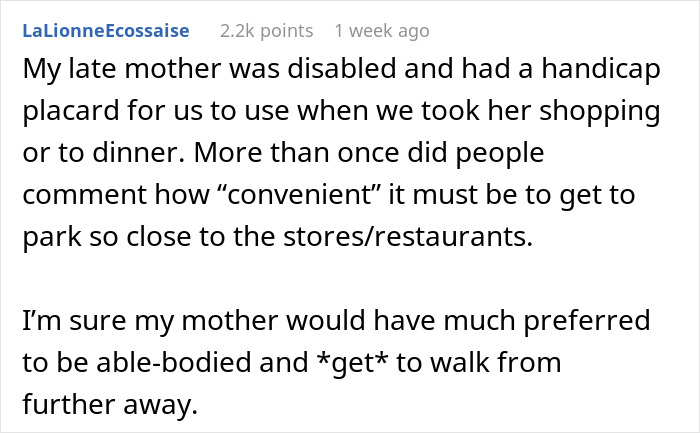
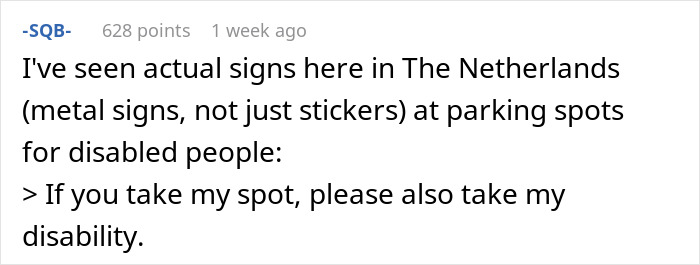
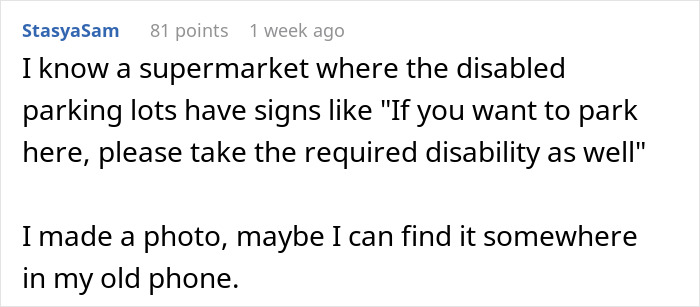
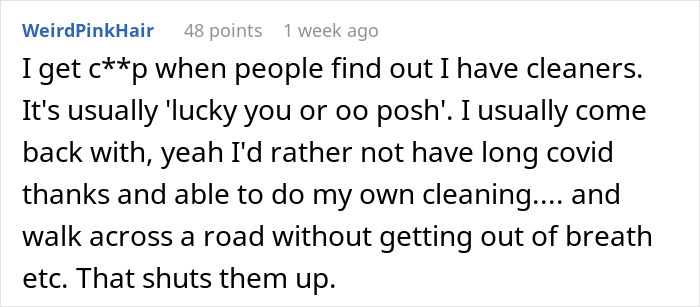

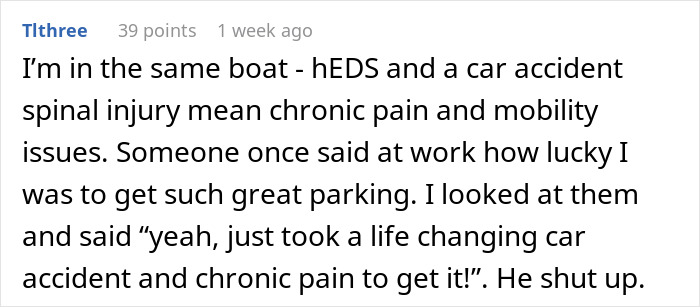

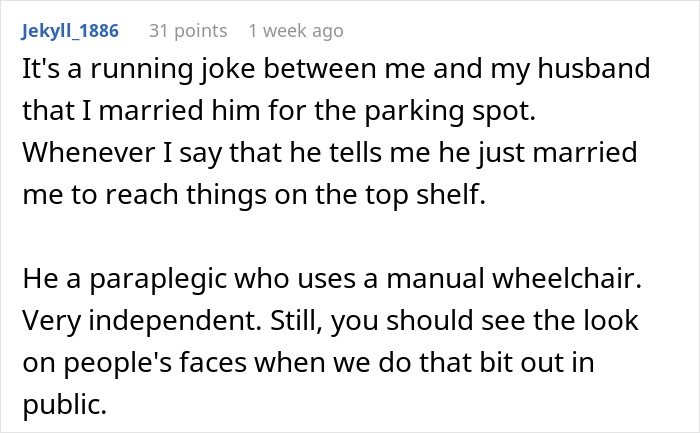
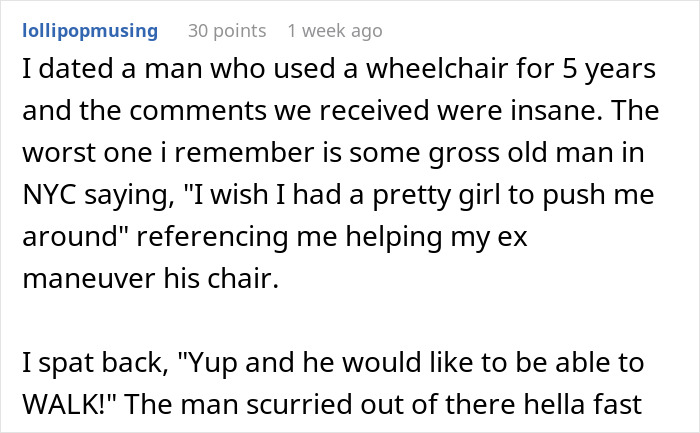
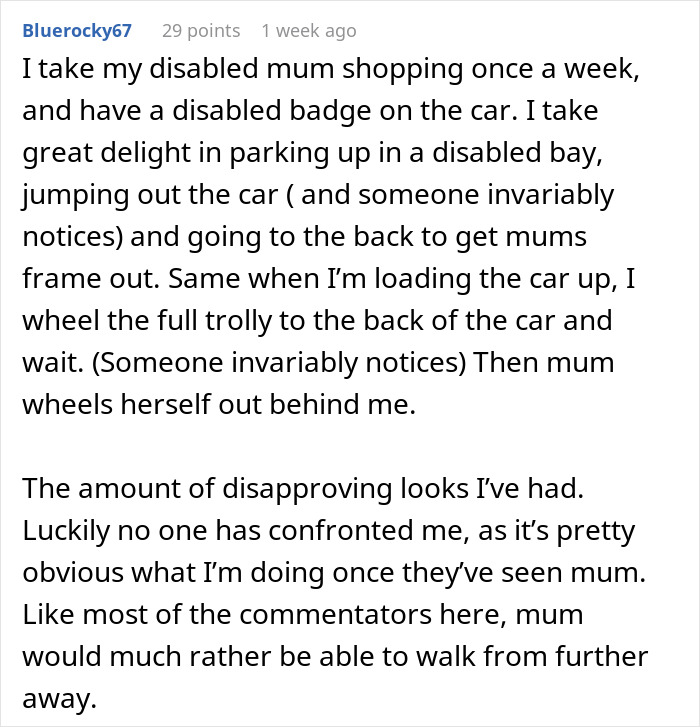
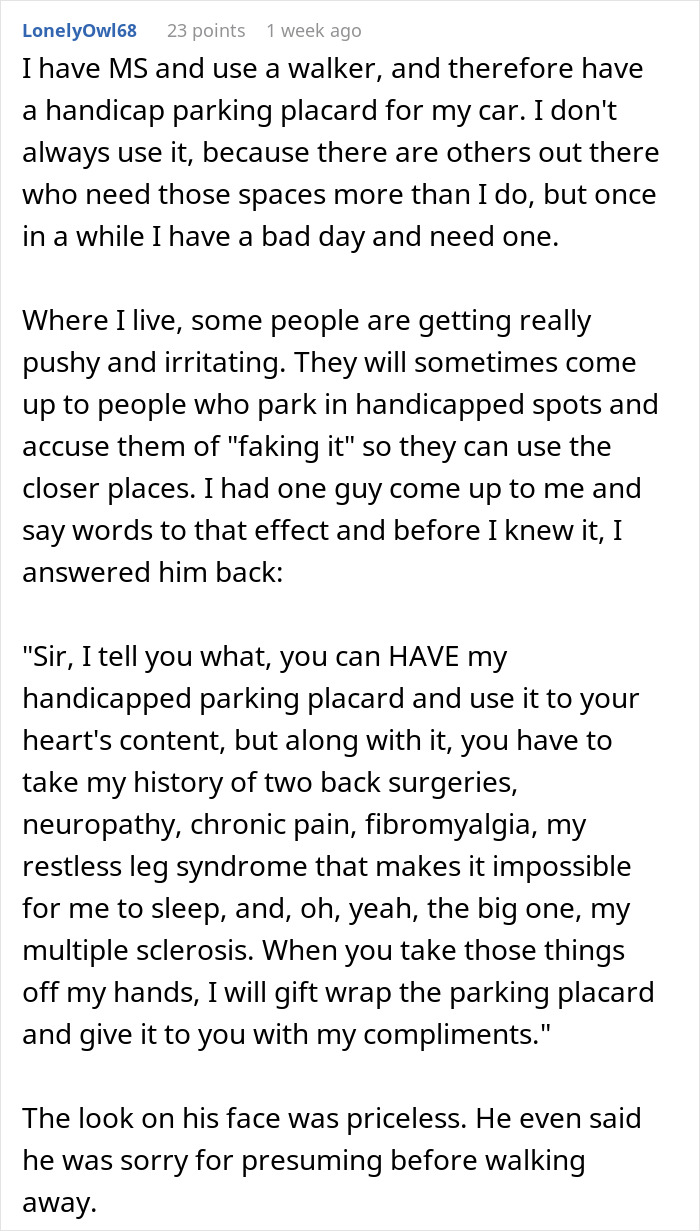




































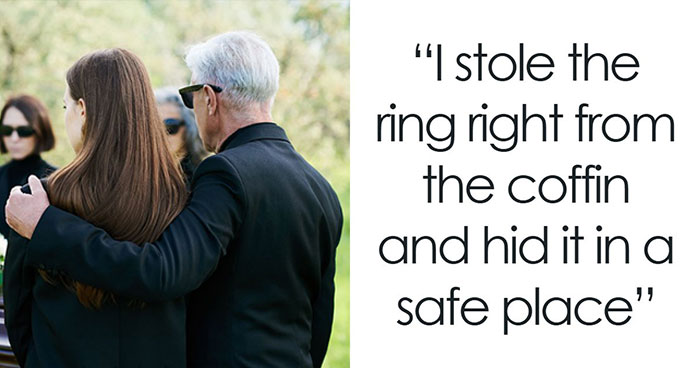











44
25